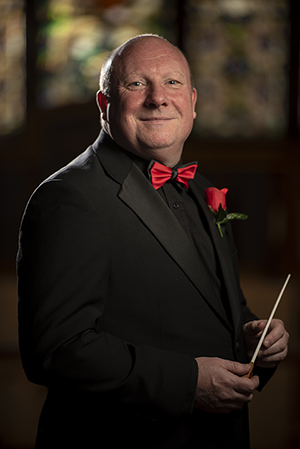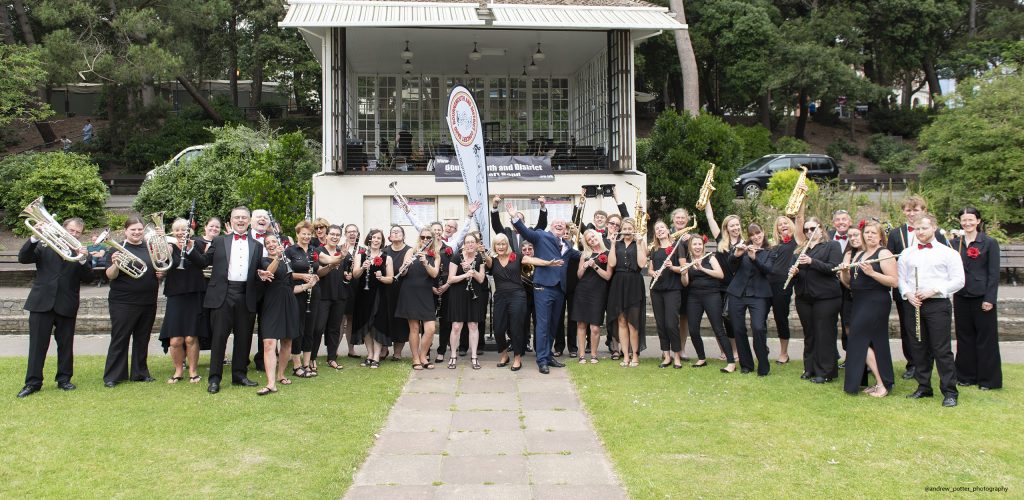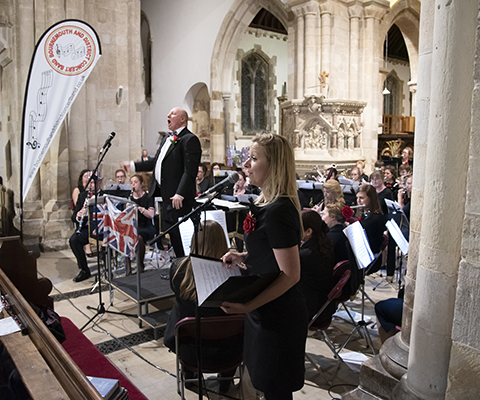Exclusive interview with band conductor Simon Nicholls

Conductor Simon Nicholls. @andrew_potter_photography
Simon Nicholls joined the Bournemouth and District Concert Band (BDCB) in September 2018. Nearly one year on, he looks back on life as our band conductor so far.
What have you enjoyed the most about your first year with BDCB?
It’s been a great first year and there’s so much to look back on! I think the very first concert in Wales will always take some beating. But overall, the most enjoyable part has been the way the band has responded to my new (sometimes whacky) ideas. I want the band to enjoy themselves and the best way of doing that is pushing everyone musically so we put on the best show we can at every gig.
What’s been your favourite piece to conduct with BDCB?
This is a hard one because every number we play becomes my favourite piece for that particular 10 minutes or however long it takes to perform. It has to be this way so that I put everything I have into getting the band to play whatever it is we are performing at that time to the very best of our abilities. As much as band is our hobby, we are there to give our audience a fantastic evening’s entertainment. And part of this is to “sell” everything that we play as a favourite and the best thing they are going to hear that evening!
What’s been the most challenging piece?
Again every piece brings its own challenges, particularly in making sure things like dynamics and articulation are precise. I guess the one that springs to mind is perhaps ‘Illyrian Dances’, however… Whilst this is challenging for the band, it is not particularly difficult when it comes to waving the stick! The challenge for the conductor with this piece is to ensure that the individual players are aware of how their part fits into the bigger picture. It really is a great piece of music, but it takes some getting used to – particularly if you are new to contemporary wind band writing.
As for “just” conducting, ‘Orpheus in the Underworld’ is perhaps the most challenging we’ve played so far when it comes to waving the stick around! There are many changes in time and style, some of them quite subtle, and it is important to try to show this as cleanly and clearly as possible for the band to be able to react.

Simon and the band standing in front of the bandstand in Bournemouth Gardens after performing a summer concert. @andrew_potter_photography
What’s your favourite piece of music ever, and why?
How long have you got? There are so many favourite pieces depending on my mood! Perhaps this could be another blog sometime, “Simon’s Desert Island Disks”?
For now I’ll just give a small selection of not necessarily my top three…
1. ‘Nothing Else Matters’ by Metallica. Amazing band and just an awesome tune.
2. ‘Royal Salute’ by Richard Waterer. Probably my favourite march and written by a former Principal Director of Music of the Royal Marines. There is nothing to beat playing this as you march down The Mall towards Buckingham Palace in a band of 200 with 20 other trombones in a line beside you!
3. ‘Final Movement of Shostakovich 5th Symphony’. Simply awesome! The story behind the piece is really interesting too.
You’ve always been musical. How did you get into conducting?

Our band performing with Simon at Wimborne Minster. @andrew_potter_photography
As part of your career progression in the Royal Marines Band Service you need to attend various courses and pass exams in all aspects of music. From arranging and composing to history of music, elements and theory of music to, of course, conducting. I found that I really enjoyed conducting as it gave me a chance to shape the music the way I felt it should be. It’s not always to everyone’s taste but I believe it is always about the performance and making sure the audience is engaged and entertained. You can do this from within the band, but it’s a lot more fun when you’re the conductor!
Do you look up to any musical role models?
I have several. It would be daft not to as otherwise how can you learn and improve?
My Dad was perhaps my first role model. He was bandmaster of our Scout and Guide Band. At a time when most other youth marching bands would spend all year just on the four or five pieces that they would play at competitions all summer, and not be able to play anything else at all, Dad was very much a believer that bands are there to entertain. And especially with marching bands, they should be able to play music suitable for every occasion. It’s something that I still believe today.
Obviously once I joined the Marines I was exposed to some amazing musicians and I was lucky to have been taught by two of the best. Albert Thompson was my trombone professor. He had previously been a member of the BBC Scottish Symphony Orchestra. Before that he had been in one of the Guards Bands. His knowledge of the symphonic repertoire was second to none. But more than that, the way he was kind, encouraging and invested so much time in us to be the best players we could be will always be something I will look up to.
My other professor was John Cullis. John had been a cellist with the Orchestra Suisse Romande and still regularly played with the Welsh National Opera. He was a huge beast of a man from South Wales and was an absolute animal on the rugby pitch where he played second row. Luckily I played for the same rugby club as him whilst I was in training, which was definitely an advantage as he had a much more robust approach to teaching than Prof Thompson! There is one story about a chair and a saw… but that’s for another time! Both of these gentlemen made a lasting impression and will always be people that I will aspire to be like.
Now that I am conducting more than playing I look to some of the world’s best orchestral conductors. If there was one that I had to pick out as someone I consider a role model it would be Gustavo Dudamel. His energy is infectious and the work that he did with the Simon Bolivar Youth Orchestra is truly inspirational.
What are your plans for BDCB for the next school year?
The next year is going to be very exciting as we build up to the band’s 30th anniversary. I have lots of ideas for new music. I want to continue to push the band musically, but more importantly so that each time we go out, we go out with the common goal of wowing the audience with our energy and enthusiasm. If the audience enjoys themselves, then I can promise that we as performers will enjoy our hobby even more!

 Next Post
Next Post